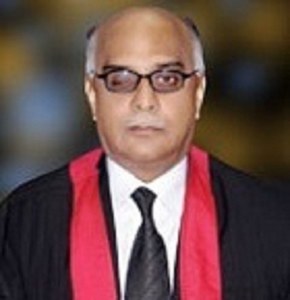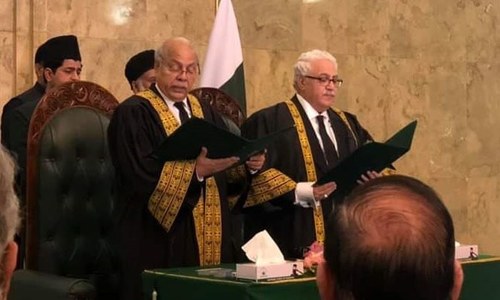Peshawar High Court (PHC) Chief Justice Waqar Ahmad Seth filed a petition in the Supreme Court on Thursday, challenging the elevation of three Lahore High Court (LHC) judges to the apex court and arguing that their appointments were made in violation of the principle of seniority.
The petition challenging the elevation of former LHC judges Justice Qazi Muhammad Amin, Justice Aminuddin Khan and Justice Sayyed Mazahar Ali Akbar Naqvi has been filed by senior counsel Hamid Khan on behalf of Justice Seth.
Besides the three SC judges, the petition names the federation, Judicial Commission of Pakistan and Parliamentary Committee on appointment of judges as respondents.
The petition, filed under Article 184(3) of the Constitution of Pakistan, states that Justice Seth was elevated to the PHC as an additional judge on August 2, 2011, and later took oath as chief justice of the PHC on June 28, 2018.
Also read: Army, govt roast judge over grisly rider in Musharraf ruling
In view of the relevant provisions of the Constitution and well-established constitutional convention/practice as well as the law laid down by the apex court in the 1996 Al-Jehad Trust and the 1998 Malik Asad Ali cases, "the petitioner has a legitimate expectancy to be appointed as a judge of the Supreme Court on the basis of his seniority, suitability and merit", the petition argues.
"But he (Justice Seth) has been ignored and superseded thrice without affording him an opportunity of being heard," the application says, adding that the appointments of the judges from the LHC have been made in violation of the principle of seniority.
According to the petition, Justices Amin, Khan and Naqvi were appointed as judges of the Supreme Court while ignoring the inter-se seniority of the chief justice of high courts as well as the importance given to the office of the chief justice of a high court under Articles 175-A and 209.
The petitioner submitted a representation against the aforesaid "injustice" to the Judicial Commission of Pakistan on March 18, 2020, but no action on the complaint has been intimated to the judge so far, the petition adds.
It notes that the Sindh Bar Council had also conveyed concerns of the legal community on the recent appointments through a letter to the chief justice of Pakistan in May. "The petitioner has been superseded thrice for no valid reason or justification," it says.
The petition states that after the introduction of Article 175-A in the Constitution, most of the appointments of judges in the apex court — except those of the three LHC judges — have been made from amongst the chief justices of high courts in accordance with their inter-se seniority.
"The independence of the judiciary is linked and connected with the appointment of judges," it says, adding that a high court chief justice whose ability and competence in the matter of selecting future judges of the high court is recognised by the Constitution "should not be superseded" while appointing judges to the Supreme Court.
The petition argues that the three LHC judges before their elevation to the Supreme Court were discharging their duties under the LHC chief justice and were junior to him. If the LHC chief justice was appointed as a judge of the Supreme Court, he would be junior to the three judges in the apex court and "the anomaly thus created is not curable under the Constitution".
Justice Seth through his petition has requested the top court to set aside the appointment notifications of the three judges and "the appointment to the vacancies thus created be made from the inter-se seniority of the chief justices of the high courts".
"Any other relief deemed appropriate may also be granted," the petition says.
The petition has not been fixed for a hearing as yet.
Earlier in March, Justice Seth in a one-page letter to Chief Justice Gulzar Ahmed had opposed the elevation of Justice Naqvi to the Supreme Court. He had warned that out-of-turn elevations to the top court would undermine the independence of the judiciary, create an anarchic situation within the judiciary by giving birth to unhealthy competition amongst judges of the high courts to achieve the coveted positions and also damage the judiciary’s image in the public.
Justice Seth has presided over a number of high-profile cases, with one of his important judgments being the acquittal of 75 convicts of military courts, most of whom were awarded death sentences.
Related: PHC CJ Waqar Seth known for his important judgments
On December 17, 2019, the PHC chief justice while heading a special court had handed down death sentence to former president retired Gen Pervez Musharraf in the high treason case for imposing emergency in the country on November 3, 2007.
The judgment was termed historical by legal circles as it was the first time a former military ruler was sentenced to death for abrogation of the Constitution.
















































